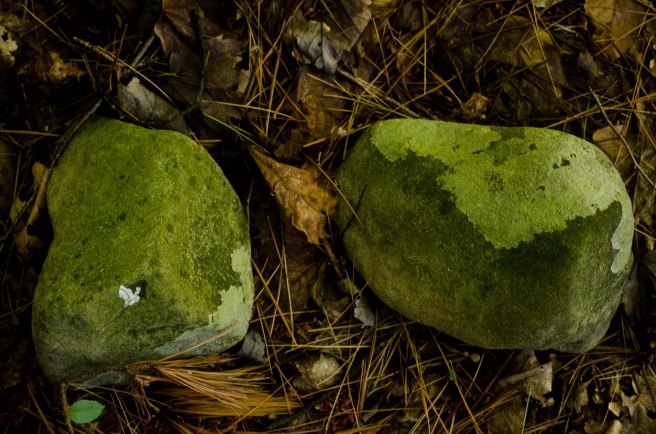
I can remember my bike chain slipping off and, after putting it back on, there was a bit a grease and sand on my fingers and hands I could just not get completely off. And I’d continue biking another eight or nine miles uphill to where the bees were buzzing in their hive. There were two plates of glass between which they had built their comb, and I read a sign as a kid on the outside of the display that told observers that bees can sense danger. From that moment on when I have been afraid I turned it around so I would not get stung, a sort of push-away feeling when I felt the danger of bees and other things. I’d felt a little low as well about the gritty, black grease that was still almost smeared off my hand, but that’s just the way it went. It could not be gotten off; that’s all.
And, I think, as the deer pull at the cucumber vines that have grown to the top of my fence; or when the cat plops on the shiny wood floor a dead bird—worst of all a bluebird; or when the birch trees I planted with my son die off after a few years, these are just the way things go. It is somehow better to feel the ever-fading day all the day than to believe or wish to believe in some hand-picked diamond that you’d really have to be crazy to think would sparkle on forever. Things don’t. You can look at Monet’s haystacks and see that all the beauty and joy in the world was always fading away at every moment. It cannot be really disappointing that way—momentary highs are not sought, breakneck speeds on the highway are not driven again, even something as simple as a daily perfect cup of coffee isn’t brewed time after time.
All exists as if it were flight upon a dragonfly’s wing. It views the water over which it flies, hovers there, and, as if thoughtlessly, curves in design and then flies off elsewhere. And with its big-eyed vision-trackers, its primordial form, its shape and its purpose, they appear almost demonic. But this backwards flying mini-phallus is only another of the many nearly comic earthly reminders that we and it and all of what is this life here are just temporary lookers-on, be it over the river, near the pond, in the mountains, through the woods, beneath the late afternoon, tomato-ripening sun.

 There had been times to do nothing at all. Nothing to make. Nothing to mend. Nothing to buy, even if it might have been needed. There really had been no need to polish anything at all. The brass pin that I had worn on my lapel, I could not remember even when I had stuck it in on the left side of my jacket, let alone gotten it. The peeling leather of my watch strap, same kind of thing. What it had been to be reminded of them now, like the weathered wooden pickets to a country fence grown gray and showing their grain splitting over time, is that these alone are the bring-about of death. When looking at an old canvas field coat, or a pair of well-worn boots, that is exactly in step with one’s own working, one’s own walking.
There had been times to do nothing at all. Nothing to make. Nothing to mend. Nothing to buy, even if it might have been needed. There really had been no need to polish anything at all. The brass pin that I had worn on my lapel, I could not remember even when I had stuck it in on the left side of my jacket, let alone gotten it. The peeling leather of my watch strap, same kind of thing. What it had been to be reminded of them now, like the weathered wooden pickets to a country fence grown gray and showing their grain splitting over time, is that these alone are the bring-about of death. When looking at an old canvas field coat, or a pair of well-worn boots, that is exactly in step with one’s own working, one’s own walking.


